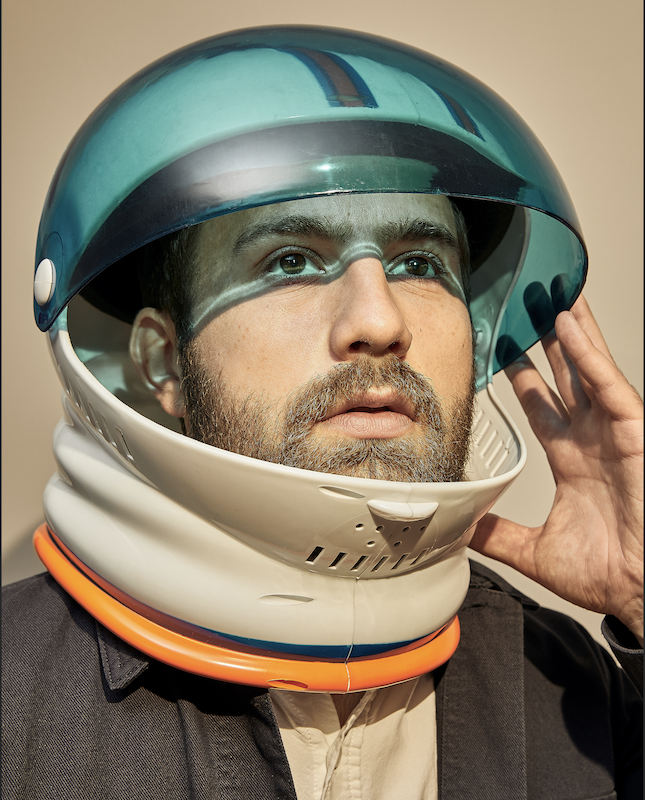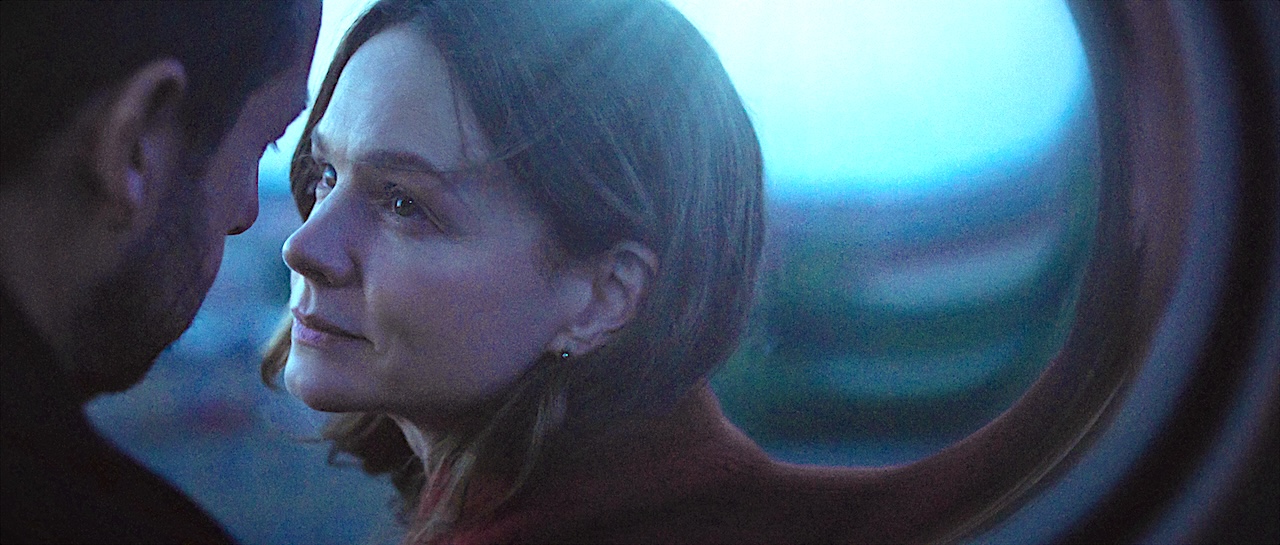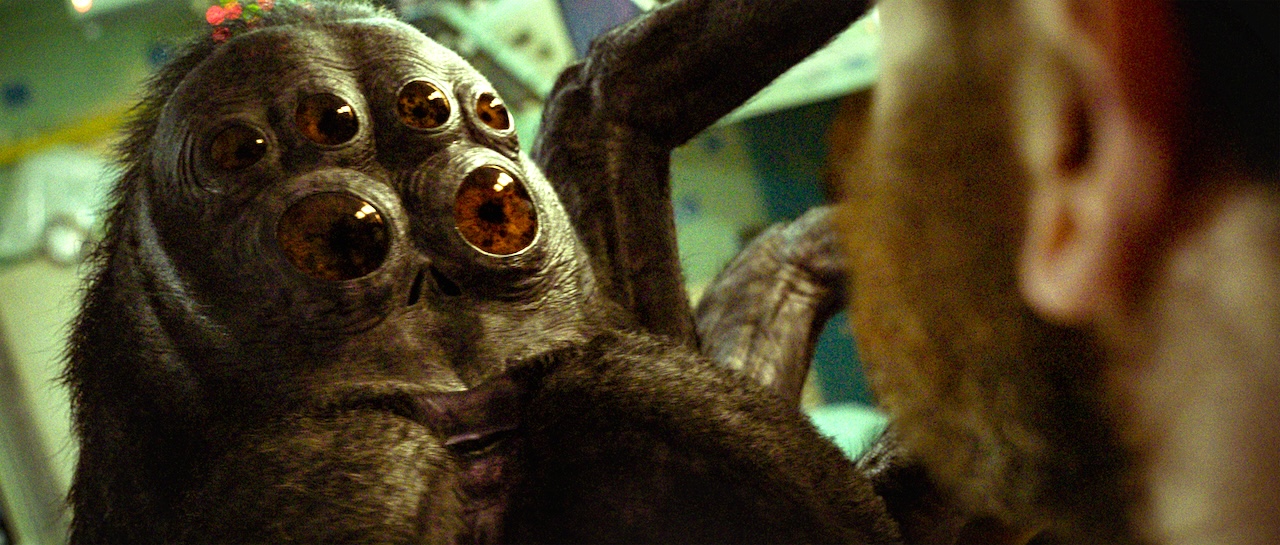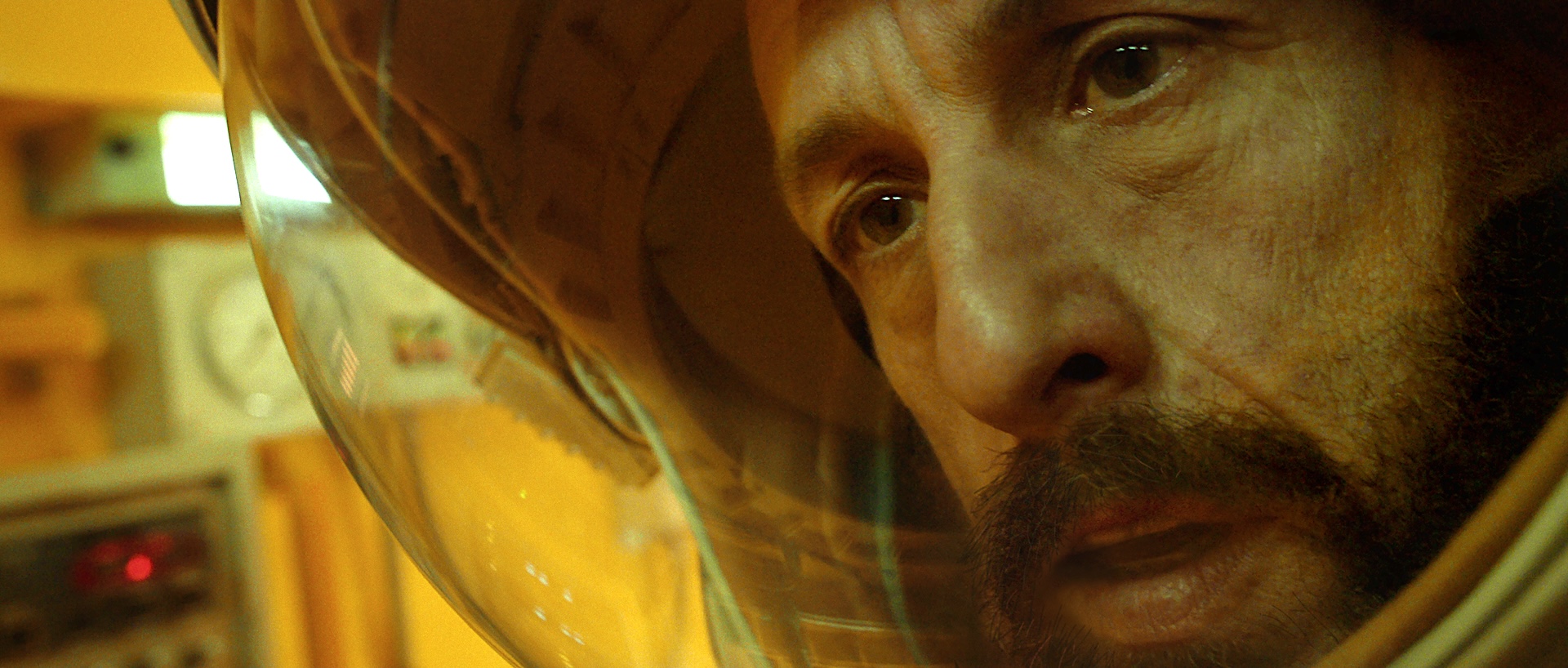“I think that Spaceman is very much about the price we pay for ambition, how and why we can and can’t connect with people, and when we choose to disconnect to protect ourselves,” muses screenwriter Colby Day about his latest film Spaceman starring Adam Sandler as “Skinny Human” Jakub, Carey Mulligan as his wife Lenka, and Paul Dano who voices Hanuš, the spider.
At its core, Spaceman tells a story of isolation and loneliness. Jakub’s loneliness stems from himself rather than being on a space mission in search of the Chopra Cloud. His feelings are intensified as he feels his marriage gradually slipping away from him. “His journey is one of learning to look outside himself and see the people and creatures around him.”
Lenka is the initiator of the separation. “I was really interested in telling a story about someone who loved somebody, but knew that the things that she loved about him would eventually be what drove them apart,” continues Day. “It’s a little bit easier to make a compromise about things that are difficult to reconcile early in a relationship, and I think the longer you’re together with someone, the more it becomes clear that you actually have to confront these big issues rather than tiptoe around them. I was interested in letting us see a woman who is tired of sitting and waiting and being the secondary focus of someone’s life.”
Jakub’s journey yields an unexpected friendship with a Hanuš – a wise spider from all time who asks him pointed questions in order to compel him to assess his circumstances. Initially, Jakub treats Hanuš as an infestation, but later feels he sorely needs him in his life. Jakub is trapped in a spaceship with a creature who’s a traveler of space and time and won’t leave until he’s done.

Colby Day
“I was really interested in telling a story about someone who was carrying a lot of weight about the past and needed to learn to let that go in order to see the future,” declares Day about Jakub who resists Hanuš for much of the film.
Adapting The Novel Spaceman Of Bohemia
The novel was written by Czech-American writer Jaroslav Kalfař in 2017. He was born in the Czech Republic and emigrated to the United States when he was fifteen. He was therefore strongly familiar with both cultures. “The novel is very much written from the perspective of someone who grew up under Communist rule with the baggage of the legacy of the Czech Republic and the Soviet Union. What does it mean to be Czech? This is an integral competent of what this means today and historically in the story.”
Colby Day found this question fascinating as well the idea of social and cultural identity. Although the main story spine of both book and novel is Jakub’s loneliness and disconnection from his wife, the novel, and Day’s earlier drafts, focused more on his relationship with his father who was initially portrayed as a hero, but was really a villain acting at the behest of the government.
Producer Michael Parets who read and enjoyed Colby’s Black List script In The Blink Of An Eye, approached him regarding a film adaptation of the book after one of his friends brought it to Parets’ attention.
Day responded positively to the story because it felt “ambitious, strange, and challenging. I really like a puzzle.” He acknowledged the literary beauty of the work, but conceded, “It’s an interesting idea, it doesn’t really work yet, and maybe it could be a movie if you changed everything.”
If I could just write something that captured what this did to me emotionally, I would consider it a success
The development of the early draft was financed by Tango. “Their one condition was that the screenplay should not be a three hour intensely introspective Czech drama.” Paradoxically, Day wrote exactly that in his first draft because he was trying to capture every aspect of the book in the screenplay.
Day credits Parets with having the insight to end the story much sooner, with the effect of cutting out many pages of the book, “but gives you the same feeling of the rest of the novel in the final moments.” The more Colby Day thought about Michael Parets’ feedback, the more he embraced it. They felt that the second half of the story could be jettisoned while still making a compelling film.
“I think with every iteration of a movie, you’re trying to balance the original conception with the new conception, with what actually works on screen, with what actually works for a viewer,” states Day.
Ultimately, the historical political landscape was deemed to distract from the central relationships of Jakub, Lenka, and Hunuš, so it was winnowed down while retaining the “flavor and feeling. “We pulled our center of gravity more into a man and his wife and less into a father and son story.”
Genre
“The genre and tone are so hard to describe which is why I love working on this,” ponders Day. “It falls into a long line of science fiction movies that use the setting of genre to explore themes like interiority and very human emotional components rather than be an adventure within the genre.”
Spaceman has elements of absurdity and the bizarre to it, but at its core, it is an emotional story
Colby adds that the humorous and absurdist elements in the book were more pronounced. “Each iteration of the script became slightly less absurd. You have the insane conceit that you’re coming into which is he’s on a ship and then he meets an alien. Our absurdist DNA ends with conception rather than carrying it through the rest of the movie.”
“The pacing is very methodical. The director Johan Renck was really interested in getting the audience to feel a drift in the same way that our character does. It’s a very simple story that takes its time.”
“The opening and ending feel feel quicker than the rest of the movie which is really an interior exploration, and so, there is a drifty dream quality to it which speaks to the characters’ headspace.”

Jakub (Adam Sandler) & Lenka (Carey Mulligan) Photo courtesy of Netflix
The screenwriter looked to movies like Moon and Gravity for tonal and thematic comparison in order to pitch the project, but stuck to his main goal of “servicing the feeling of the novel rather than the genre.”
Who Is Hanuš?
The dream-like nature of the spider from all time remains a mystical element of Spaceman. Both novel and film deliberately make the reality of Hanuš unclear. Is he a projection of Jakub’s shadow subconscious or an actual creature? Colby Day declines to answer one way or another.
Hanuš presents as a reciprocal mentor to Jakub. Both feed off each other. “He has as much to learn as Jakub, but in a very different and stranger way. Hanuš, on of a metaphorical and subconscious level, represents curiosity and a lack of ego.” He observes and questions without judgement. He postulates to Jakub, “Maybe you’re the source of your loneliness?”
All Hanuš’ questions and interest in humankind are geared towards wanting to understand the feelings they have
Hanuš reflects these curious human feelings back to Jakub so he can better understand himself as Lenka drifts further away. He is not an all-knowing prophet.
Hanuš is also a character that needs to grow. “He comes in with the certainty of ‘The universe is as it should be.’ But, he weirdly learns that doubt, fear, need, and emotional desire are of value too. His journey is one of being confident to feeling fear of being alone. You can’t really move through the world with like a sense of everything. It’s an inverse track of what Jakub is dealing with.” Jakub and Hanuš eventually meet in the middle.
The deeply philosophical creature continues his rhetoric on the universe particularly with the concept of beginnings and endings. Hanuš grapples with the notion when he realizes that his time with Jakub and Lenka is finite. The concept follows the shape of a circle which has no discernible ending or beginning. Each end is also a beginning.
Colby Day treats these hefty philosophical concepts with a velvet glove. “The fear with anything that starts to be the about meaning of life is that it can start to feel really pretentious or really banal, or both. I was very concerned with how you represent this idea of what defines the universe through a new perspective.” The universe is finite and infinite.

Hanuš (voiced by Paul Dano) & Jakub (Adam Sandler) Photo courtesy of Netflix
The theme of loneliness and isolation is compounded by a sense of loss for Jakub, Hanuš, and Lenka. “The culmination of his friendship with Hanuš is the moment that’s most profoundly saddening to me and also freeing in a way. This is what had to happen, but I’m devastated. I think that the loss of a mentor and friend also reflects the loss of Lenka.”
Writing Challenges
“I think that the most difficult thing, and it was difficult from first draft up to the edit of the movie, was when and how to deliver the information about Lenka’s choice to leave Jakub.” She’s pregnant and must start a new life with grace and purpose.
Much of the novel, as well as early drafts of the screenplay, involved “a lot of table setting about the mission. Lenka’s decision was made at the end of act one. It was both was a structural and a dramatic scene construction challenge. How do you write a scene in which you leave a partner that you’ve been together with for so long? When you’re having a child, it was such an emotionally difficult scene to put a character into and have them do that alone without an acting partner felt impossible.”
The second hurdle was deciding where to place this scene in the context of the story.
“Regardless of the fate Jakub and Lenka were dealt, when two particles collide, even if they then separate, they are forever intertwined in some way. I think that was the intent with their relationship. There’s no undoing the things that have been done. It is now a new trajectory for these two entities.“
